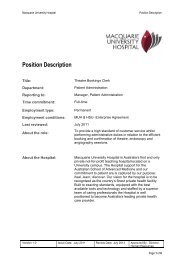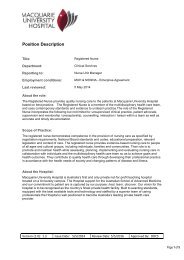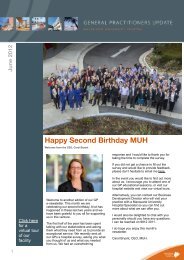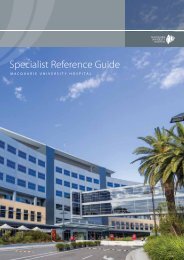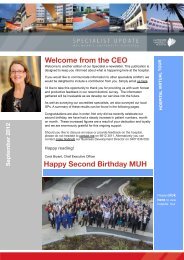Plenary Oral Presentations - Macquarie University Hospital
Plenary Oral Presentations - Macquarie University Hospital
Plenary Oral Presentations - Macquarie University Hospital
Create successful ePaper yourself
Turn your PDF publications into a flip-book with our unique Google optimized e-Paper software.
16 th International Meeting of the Leksell Gamma Knife ® SocietyMarch 2012, Sydney, AustraliaP-BE-214Endocrinological evaluation of growth hormone-secretingpituitary macroadenoma invading cavernous sinus treatedby aggressive transsphenoidal resection followed by GammaKnife radiosurgery1Jong Hee Chang, 2 Min Cheol Oh, 2 Eun Jik Lee, 1 Sun Ho Kim1Department of Neurosurgery, Yonsei <strong>University</strong> Health System,2Department of Endocrinology, Yonsei <strong>University</strong> Health SystemObjective: The authors would like to determine long-term effect of Gamma Knife radiosurgery (GKS)for the treatment of remnant tumor in the cavernous sinus (CS) after operation using transsphenoidalapproach (TSA) of growth hormone (GH)-secreting pituitary macroadenoma.Methods: Seventeen patients who failed to achieve biochemical remission after TSA were followed fora mean period of 70.2 months (range 17-180) after GKS. All patients underwent regular hormonalexamination including serum GH, IGF-1, oral glucose tolerance test, and combined pituitary functiontest (CPFT). Magnetic resonance imaging (MRI) was performed 6 months after GKS and thensubsequent one year interval. All patients had remnant tumor only in the CS and receivedhormone-suppressive medication, sandostatin LAR before or after GKS.Results: There were 13 women and 4 men with a mean age of 41.8 years (range 27-62). Ten patients( 58.8%) achieved hormonal remission with a mean time of 47 month (median 40, range 18-129)after GKS and mean radiation dose to tumor margin was 27.9 Gy (range 14-35). Mean tumor volumedecreased from 5.2 ml (at pre-GKS MRI) to 3.6 ml (at the last follow-up MRI) (p=0.000). Actuarialrate of hormonal remission at 2, 4, and 6 years were 12.5%, 40%, and 64%, respectively. Intergroupcomparison between remission and non-remission group those who had a minimum hormonal followupperiod of 48 months, showed both ‘serum level of GH’ and ‘degree of decreased GH percentile’ at12 months after GKS showed significant difference (p=0.023), (p=0.014), respectively. A new pituitaryhormone deficiency that has significant difference was found only in gonadal axis (p=0.032) based onlast follow-up CPFT. A radiation necrosis was detected in 4 patients.Conclusions: GKS for the remnant tumor only in the CS after maximal resection of sellar andsuprasellar portion of GH-secreting pituitary macroadenomais effective, especially for minimizingnewly developed post-GKS hypopituitarism. However, careful dose planning and long-term follow-upshould be necessary in terms of prevention and effective management of radiation-inducedcomplications.82



